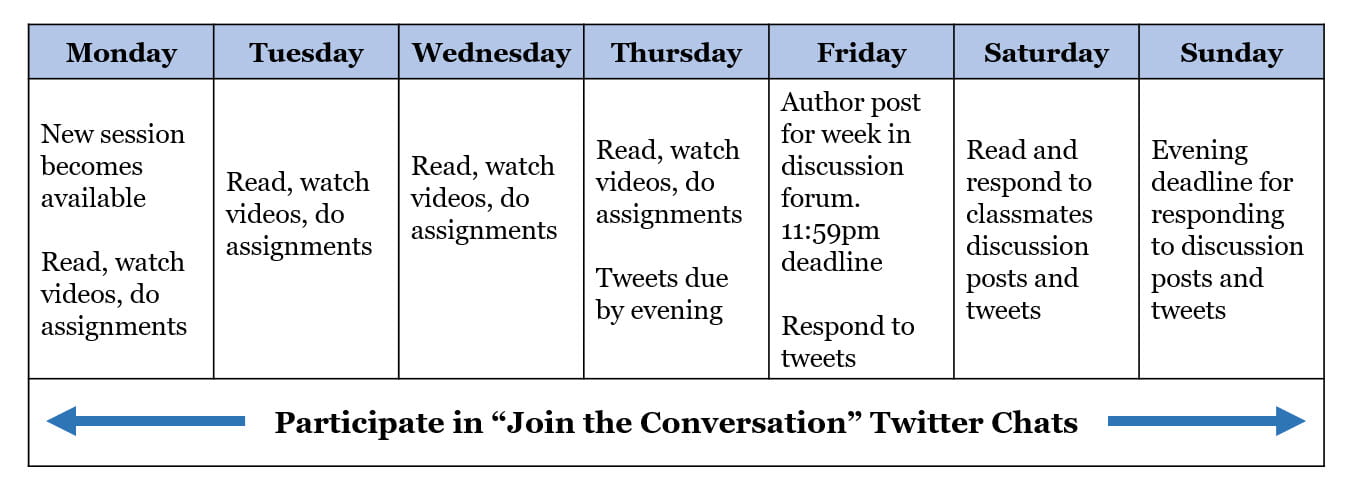Like many faculty members, you may find that you enjoy the time flexibility and time-shifting that can occur when teaching online, but there are definitely time considerations. Teaching online carries with it time adjustments that you should recognize and factor in to your professional (and sometimes personal) life.
Connecting and communicating with students online takes time. Discussion forums will extend and strengthen the social interaction that occurs naturally in a face to face class. Students who were otherwise shy, or at least not participative in the live discussion in a f2f class, will often come out of their shells and spend a great deal of time participating in the online discussion. Students who tend to dominate live discussions will still participate in the online discussion, but others will have a chance to respond because the discussion is asynchronous and extended over time.
However, these benefits come at a price. Time requirements need to be carefully considered for both students and faculty. Managing time is critical in order to prevent students from leaving because of lack of interaction and to make sure faculty do not over-or under-do the time on task in an online course. Over-doing it could result in faculty burnout and under-doing it could result in lower student retention. A balance needs to be found that will work for everyone involved.
As Tamar Shulsinger noted in the Northeastern University Graduate Programs blog:
“…Everyone has the same 24 hours in a day, meaning, it’s not about how much time you have, but how well you can manage it.
This is especially important for online students, who are often working full-time, taking care of family, or juggling other commitments. Without the camaraderie of a class to motivate you or having a set time where you need to be on campus, effective time management is crucial to helping you stay focused.
In addition, effective time management not only helps with your learning, but can also make you more productive at work and in your personal life. If you’re serious about successfully completing your online degree, it’s crucial to find a good time management system to use.”
Web Learning Curve
Part of your time management process will be the learning curve in the use of the learning management system or other online website you use, such as Slack or Microsoft Teams. Not only do you need to know how to use these sites, but you must be prepared for upgrades and new releases of the software, something which always seems to add challenges.
Take the Focus off the Technology
Just as you need to learn how to use your LMS, your students will also require some time. Here are some strategies that you can use to help the students right away, saving time and taking the focus off the technology and putting it on the content.
- Structure the course carefully
- Use the discussion forums extensively
- Do not overload the students the first two weeks
- Publish the course schedule in several places in the LMS
- Let the students help each other
Shulsinger suggested six time management tips for online students:
1. Plan Ahead
I share a typical week with my students that looks like this:
 I also provide details on upcoming written assignments, such as papers, which are generally due on Sunday evenings. Given that my students typically cover four to six time zones, I define Sunday evening as “local time”, so as to not overly pressure those living on the West Coast, nor confuse those living in Europe.
I also provide details on upcoming written assignments, such as papers, which are generally due on Sunday evenings. Given that my students typically cover four to six time zones, I define Sunday evening as “local time”, so as to not overly pressure those living on the West Coast, nor confuse those living in Europe.
2. Don’t Multitask
Shulsinger noted that students should focus on one assignment at a time and zero in on the specific task at hand, whether that’s studying for an exam, reading a textbook, emailing a professor, or participating in an online forum. Arrange your tasks in order of importance, and pay attention to the three or four crucial tasks that require the most effort.
3. Set up your virtual office
Good advice at any time, and critical during the COVID-19 lockdown.
4. Block out distractions
Shulsinger suggested working in 25 minute work sessions, with breaks between.
5. Reward yourself
Whether it is a cup of coffee or a great show on Netflix, mix leisure with work … and study.
6. Get a good night’s sleep
Help your students factor 8 hours of sleep in to their busy life … and take care of your own body and mind as well!
